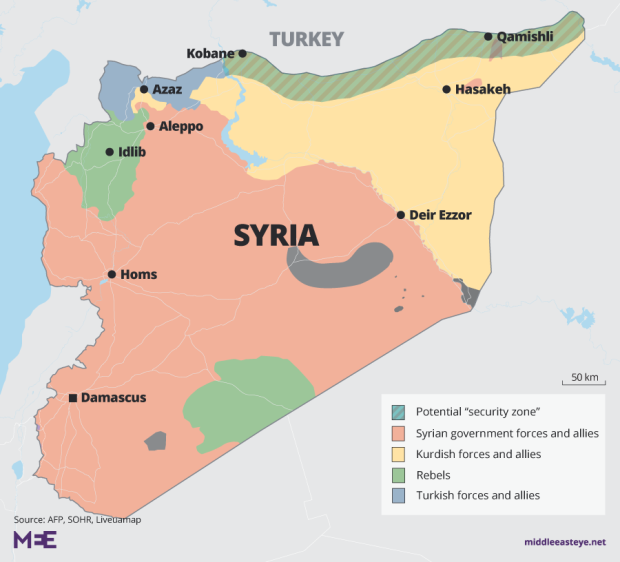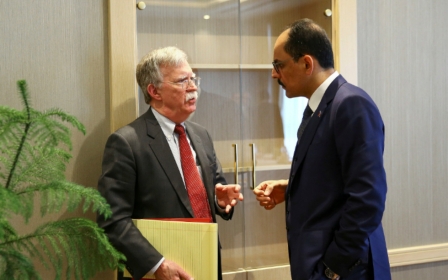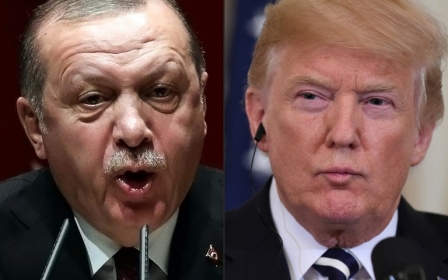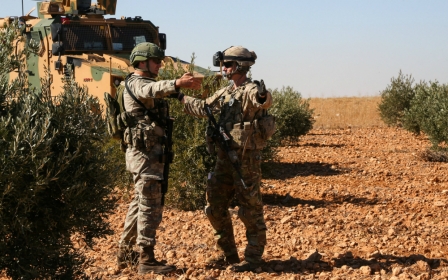Syrian Kurds reject 'security zone' under Turkish control
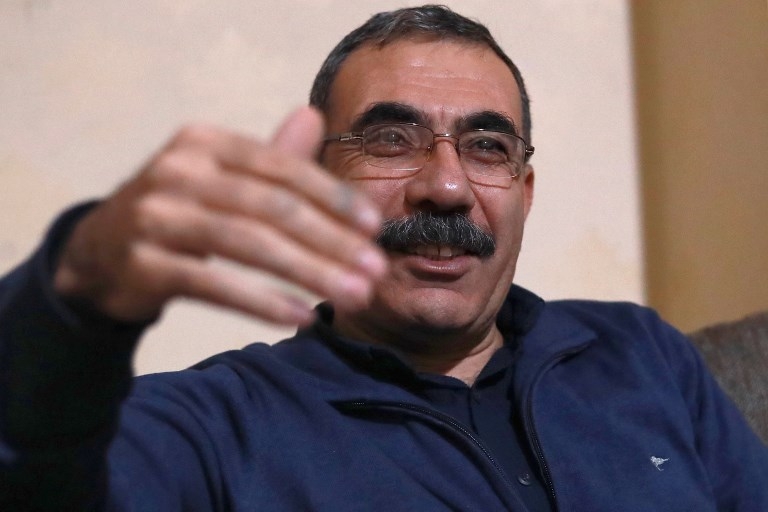
Syria's Kurds have rejected a US proposal for a "security zone" under Turkish control along the Syrian side of the two countries' border.
Senior political leader Aldar Khalil said the Kurds would accept the deployment of UN forces along the separation line between Kurdish fighters and Turkish troops to ward off a threatened offensive.
"Other choices are unacceptable as they infringe on the sovereignty of Syria and the sovereignty of our autonomous region," Khalil said.
Khalil played a key role in establishing Syria's semi-autonomous Kurdish region in 2013.
Turkish President Recep Tayyip Erdogan said on Tuesday that Ankara would set up the "security zone" in after it was suggested by US President Donald Trump.
Erdogan's announcement came a day after he had a telephone conversation with Trump to ease tensions after the US leader threatened to "devastate" the Turkish economy if Ankara attacks Kurdish forces in Syria.
Turkey has welcomed Washington's planned withdrawal of some 2,000 US troops from Syria but the future of the US-backed Kurdish People's Protection Units (YPG), labelled terrorists by Ankara, has badly hit ties between the NATO allies.
Erdogan said he had a "quite positive" telephone conversation with Trump late on Monday where he reaffirmed that "a 20-mile [30km] security zone along the Syrian border... will be set up by us."
'Language of occupation'
Damascus meanwhile denounced Erdogan's "language of occupation" in talking about a security zone.
"The statements made today by the Turkish president reaffirm that this regime... does not deal [with anyone] except in the language of occupation and aggression," state news agency SANA quoted a source at the Syrian foreign ministry as saying.
The Turkish army has launched two major operations in Syria dubbed "Euphrates Shield" in 2016 and "Olive Branch" in 2018 to combat Syrian Kurdish fighters as well as Islamic State.
The last offensive sought to roll back gains by Syrian Kurdish fighters who have governed parts of northern Syria since 2012. In March, Turkish-backed forces seized the Kurdish majority city of Afrin, causing thousands to flee.The deployment of Turkish troops and their proxy forces in areas of northwest Syria has drawn accusations by some critics of a Turkish military occupation.
"Comparing Turkey's presence in Syria with that of any other state or power is an insult to both history and our civilisation," Erdogan said.
Turkey 'to control zone'
Turkey is home to over three million Syrian refugees.
Since early in the conflict, Ankara has called for a safe area backed up by a no-fly zone on its 900km border with Syria to protect civilians from air and ground attacks.
But support for the proposal has waned.
The plan was originally mooted to Trump's predecessor Barack Obama, so that a safety zone could be provided for Syrian refugees on the condition that Washington provides logistics and air support, while Ankara supplies ground security, Erdogan said.
"Unfortunately Obama failed to take the necessary steps," he said, speaking to journalists after his parliamentary address.
But after the discussion with Trump, Erdogan said that plan could be resurrected and the 30km "security zone" could be extended, if needed.
It could be created in cooperation with the US-backed international coalition fighting against IS, which Turkey is also a member of.
"We could create such a safe zone if coalition forces especially America provide logistical and financial support," Erdogan said.
"That would also entirely prevent an influx [of refugees]."
The Turkish leader however dismissed any presence of the YPG in that zone.
Erdogan's spokesman Ibrahim Kalin said the security zone would "be controlled by Turkey, with the deployment of Turkish military, intelligence activity and the involvement of the locals".
He said its modalities were being discussed with Washington, adding the Turkish army chief General Yasar Guler was due to meet Wednesday with his US counterpart in Brussels.
Trump's tweet 'saddened me'
US support for the YPG during the Syria conflict has been a major source of friction between Ankara and Washington. The US regards the YPG as an effective ground force in the fight against IS.
Ankara has however threatened to launch a cross-border operation to eradicate Syrian Kurdish fighters it sees as an offshoot of the outlawed Kurdistan Workers' Party (PKK).
The PKK, which has carried out a decades-long insurgency against Turkish forces, is blacklisted by Turkey as well as by the US.
But there have been concerns in Washington that Kurdish groups are being abandoned to attacks in the future by the far more powerful Turkish military.
Erdogan on Tuesday said Trump's tweet "saddened me and my friends," but added that the two leaders reached an agreement "of historic importance" during Monday's phone call.
The Turkish president said he would visit Russia on 23 January for a meeting with President Vladimir Putin over the US troop pullout plan.
Middle East Eye propose une couverture et une analyse indépendantes et incomparables du Moyen-Orient, de l’Afrique du Nord et d’autres régions du monde. Pour en savoir plus sur la reprise de ce contenu et les frais qui s’appliquent, veuillez remplir ce formulaire [en anglais]. Pour en savoir plus sur MEE, cliquez ici [en anglais].


